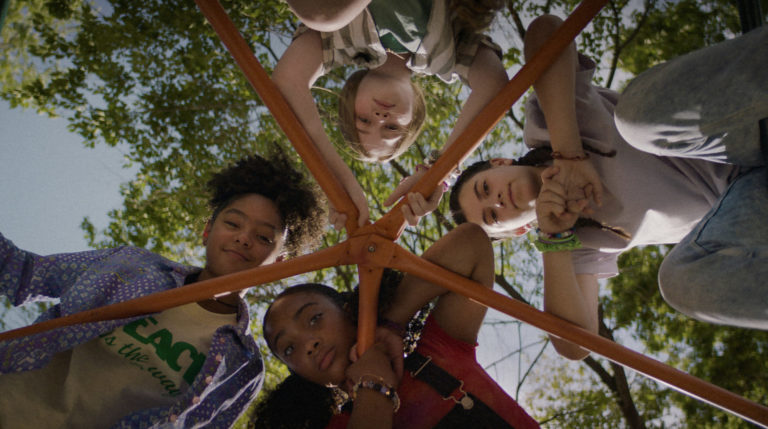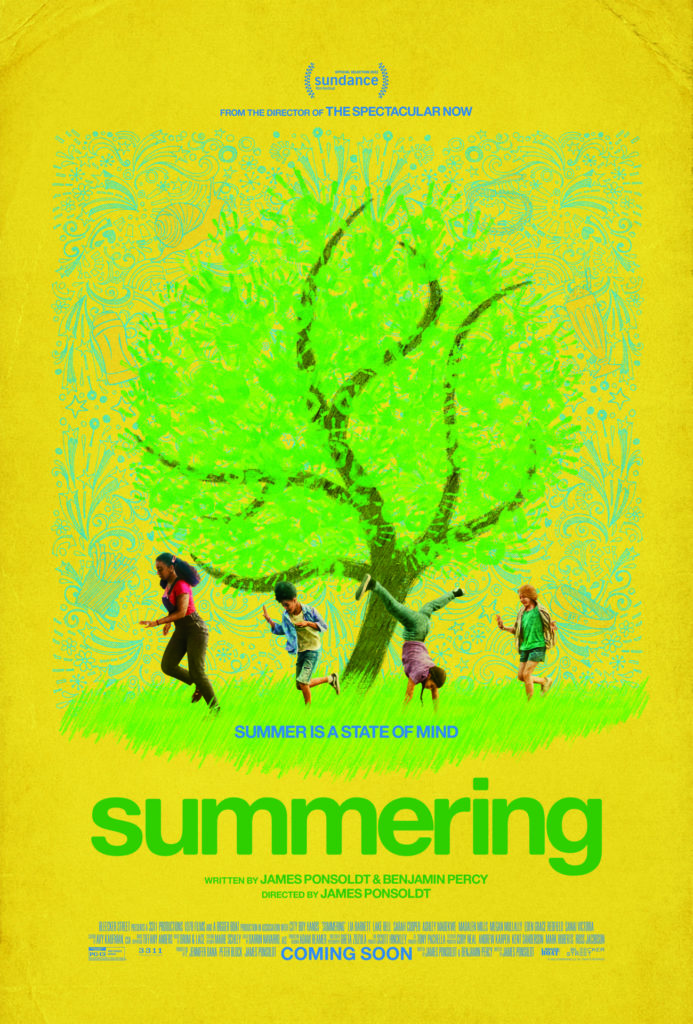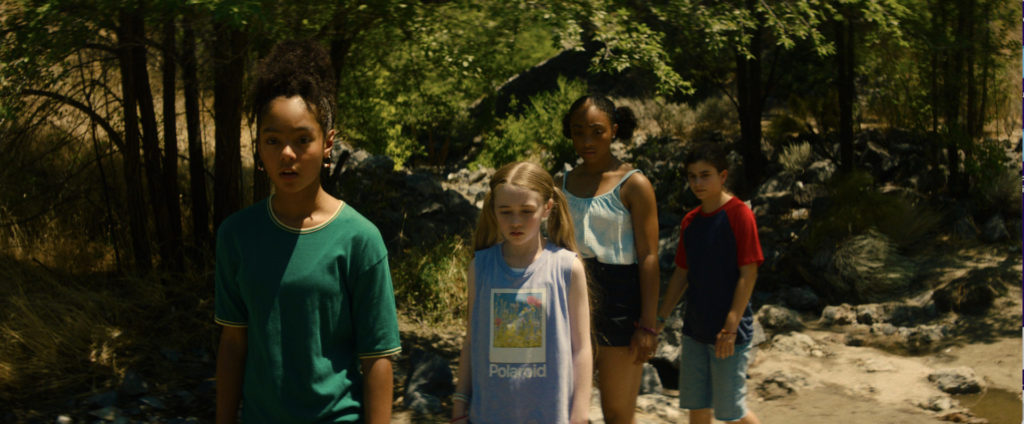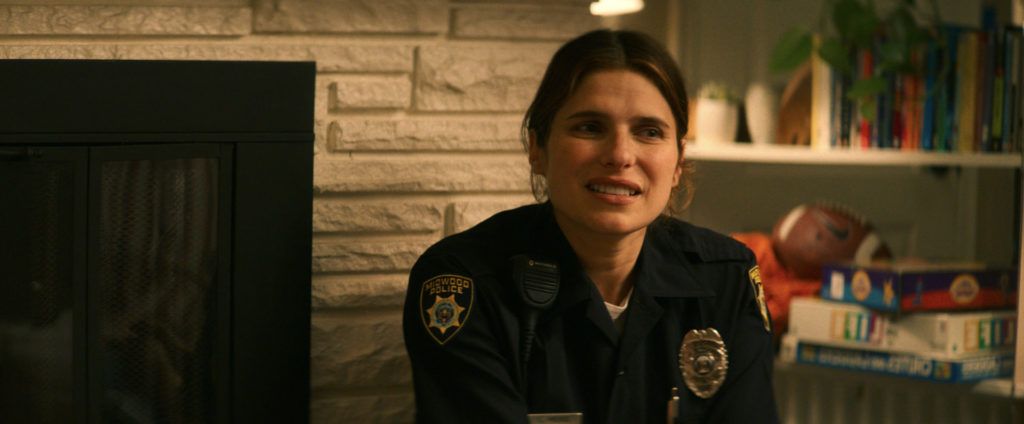

Exclusive Interview with Director James Ponsoldt
Q: You’ve worked with some great actors, such as Tom Hanks and Nick Nolte. It’s been awhile since you did a feature film. You’ve done TV series and TV movies. What made you decide to tackle this film?
JP: I think “Summering” was, first and foremost, informed by being a parent. I have three young children, which is my number one job: being a parent to my kids and a partner to my wife.
With “Summering,” I’ve been interested in telling stories about the dynamics between parents and children, and issues related, in some cases, to structural violence for a long time. In my thesis film [“Junebug and Hurricane“] — done before I made “Off the Black” — was a story about a single mother and her daughter. Janeane Garofalo played the mother. Those stories are things that I’ve always been interested in and especially as someone who is so much of my cultural upbringing. I was watching movies with my sister and mother.
“Summering” began with a dead body. There was a man found dead not far from where I lived and he couldn’t be identified, and still hasn’t been. The fact that he didn’t even receive the dignity of being named when he died was a signifier of larger, more troubling cultural breakdowns. There was a sense of inequity, a lack of justice.
I began having conversations about that with my family and friends. I tried to explain to my children, how that came to be, trying to ask them how that made them feel. Those conversations slowly grew into “Summering” — the story as it exists now.
Part of it came from my conversation with Ben Percy, who’s my co-writer. I’ve worked with him on different things for over 15 years, I had adapted a short story of his that was originally in the Paris Review called “Refresh Refresh” 15 years ago, and ultimately my screenplay was turned into a graphic novel by Danica Novgorodoff. That was about young men, violence and toxic masculinity. [Percy] is also a parent with kids who are the age of these characters.
I’ve always been interested in multiple subjectivities in stories, depicting people’s experiences and different people’s experiences at the same time. I try to lean into that while being as specific as possible. I think we all benefit through multiple subjectivities, and If we want to understand the way structural violence is transmitted through society we have to lean into the subjectivity of different characters, their children and the way it affects them.
Q: In this film, Mari’s mother is very much monitoring what Mari [Eden Grace Redfield] is doing, even when she’s browsing on the internet. As a father, how do you know when you draw the line when it comes to what’s private even for the kids?
JP: It’s complicated. I don’t have an easy answer. But with myself and with my friends who have children, we’re all trying to work our way through it. We start by taking cues from our own parents, and whether we have good or bad relationships with our parents.
We either use them as models or try to do the exact opposite of what they did. Or somewhere in between. Speaking for myself, parents try to strike a balance between recognizing the autonomy of a child, their need to have their independence and freedoms to make their own mistakes, to experience a life of real fearlessness, while also wanting them to be safe. and maybe to be honest with them and to express love by creating boundaries, maybe. And to be honest, probably projecting my own anxieties on them.
I think there’s that constant interplay between parents and children where — much like the characters in this film — we project back our own memories of our childhood and what our childhood was, and what we think was good or bad about it. In some cases, we’re revisionist historians about what actually happened: it actually didn’t happen that way, but maybe it’s the way we wanted it to happen, and we’re working through that with our kid. I think it’s a complicated dance between parent and child that I find myself improvising my way through all the time, and just trying to lead with love and honesty.

Q: Talk about the process of casting all those wonderful girls?
JP: It began first by conversations with my producing partner Jennifer Dana, and then with our casting director Avy Kaufman. She’s an amazing casting director that I’ve worked with since my very first feature “Off the Black“.
With both of them, I listened to their interpretation of the script and of the characters as they existed on the page. To them, a lot of it was telling me stories about what their childhoods were like when they were eleven-year-old girls. In some cases — like with Avy — she talked about what it was like to be a parent, what she’s felt and how hard it can be later to either maintain friendships or make new friends — things our characters in this film deal with.
Then Avy began auditioning and doing readings with dozens and dozens of young actors. Because they are young, it’s different from casting someone who’s thirty or is old, who might have a lot of credits. In many cases, you’re discovering them through the casting process. Avy was a big advocate for actors that she believed in. Because it was happening during Covid, we would meet over Zoom. Avy would introduce us. We would talk. I would ask questions about their lives. I was interested in their imaginations, probably their minds much more than their ability to say the lines as written. Then we would read through scenes, improvise and try things out.
Then it was assembling what would be a believable friend group, and having the young actors meet each other over Zoom, read together, play together and have conversations. It was a conversation that kept growing and growing. I tried to step back and just listen and try to learn, and try to understand that I have my own blind spots, and that these amazing young actors understand these characters far better than I do. They’re living some version of these characters.
Once we had our four girls, [then it was] finding the right actors that felt like they could believably be their mothers. I was lucky enough to cast some actors that I had worked with before, like Megan Mullaly, and some that I was a big fan of like Lake Bell. I was then discovering for myself other people like Ashley Madekwe and Sarah Cooper, who I’m a big fan of and [I’ve] seen on the internet videos that she did.
Q: What’s fascinating about this film is that the kids are dealing with a situation that might be different from what adults would do. The kids have their own approach. How did you develop that element?
JP: It’s very easy through our adult lives to assume, “Well, this is what I would do in a traumatic situation.” Of course, I would do “the right thing,” whatever that is. But for a child right now, the way they process trauma, the things that they’re being confronted with, the questions they have. [And] who they look to to protect them or not protect them.
A lot of the structures that existed I believed were reliable and safe, but I think young people don’t [think so]. So I’m very interested in stories about characters who don’t make the “right decisions” — and they make a decision that’s questionable. Maybe they have good intentions, but they make a bad move. Or they take a curious approach to something that’s unique from the one that I would. I think so much about the characters’ age informs it.
That’s a lot of why I go to watch films — to watch people do things that I wouldn’t do. To watch a film where I was in that situation would probably be a very boring one.

Q: In this film, Laura, the mother of Daisy(Lisa Barnett), is played by the wonderful Lake Bell. Her husband has just left her and she has to try and make ends meet with two children on her own. What would be going through the kids’ minds? There are a lot of households like this one. Did you do any research about single parenting?
JP: I have. That dynamic is one I know really well. My wife was raised by a single mother, and many of my friends have been raised by single parents. Many of them are single parents as well. So it’s something that I’ve seen a lot. Through the perspective of children who are now adults — My wife also works at a school of sixth through 12th graders, so kids come in at age 11 or twelve, the age of these characters. With a lot of these kids, their parents are divorced, separated or going through a separation. It’s something that I’m around a lot.
One thing I’ve just become aware of is that there’s many types of privilege. There’s privilege related to class, privilege related to gender — all these things that they think can be taken for granted. But the ability to have time, and be attentive in your child’s life is a privilege that is easy to take for granted. To be able to have the time to be around, to not have to be working constantly is a privilege. It’s one of our greatest privileges that not everyone is lucky enough to have. To have that time to just be able to be around their kids and be informed about everything that’s going on in their life. Some people just have to work a lot.
Q: I heard some of the girls’ conversations were spontaneous. How much did you allow for their own spontaneous things or for them to improvise?
JP: A lot. Before we even filmed, I had them in Zoom rooms like this, talking with each other about all the issues related to the film. I had them going through scenes and asking them, “How do you talk to your mom?” “How would you talk to your friends?” “What would you do in this situation?” A lot of it was just listening to them and letting them put their fingerprints on it and make the characters their own. That just continued as we went. With conversations that they had with the actors playing their mothers, those dynamics became more personal and real to the way that they would say things.
All the actors were my partners in this. The characters had full ownership to say things the way that they would to make them as real as they would be to them. So these are very much creations of these actors in a lot of ways.
Q: What do you take from making this film that you could apply to your family as a father?
JP: I think because I was so close with my mother and sister as a kid, I saw their friendships in action. I had a sense of how their friendships were different from my friendships with the boys that I knew. In making this with my female collaborators, I have a more nuanced understanding, or curiosity, of how male friendship and female friendship, especially at this age, can be different. For the characters in this film, they’re able to articulate the value of their friendship. It’s something that they value and can talk about the specialness of it.
Boys at that age might not. They might not be able to talk about those emotions, or articulate them. They might only be able to talk through the lens of a third thing, like music, movies or sports, but not about how much they care about each other — that can be hard even for grown men to talk about.
I have a deep value of it and I think those types of friendships are things that need to be valued and be included in films. I have children that are both boys and girls. It’s something that I’m going to try to better understand and create an environment of love and support to nurture it.
Check out more of Nobuhiro’s articles.
Here’s the trailer of the film.

